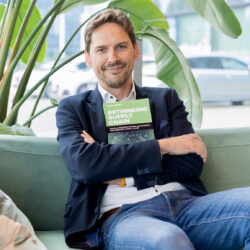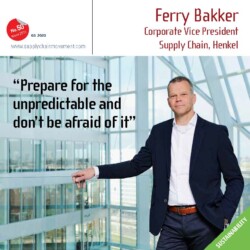Bram Desmet enriches supply chain model with sustainability and resilience

Supply chain guru Bram Desmet recently presented his new book ‘Rethinking Supply Chain’, in which he introduces models for a five-dimensional supply chain with which companies can make the ‘classic’ trade-off between service, cost and capital, but can also factor sustainability and resilience into their planning process. ‘Companies now just shout about sustainability, without realizing the impact it will have on their supply chain.’
By Harm Beerens
Bram Desmet is a man of models and innovative ideas aimed at advancing the field of supply chain planning. In his new book, each chapter contains at least one new viewpoint that offers optimism for his peers. The first chapter introduces the fourth-generation supply chain with a model consisting of three pillars: profit, people and planet. In chapter two, he enriches his now-classic service/cost/capital triangle with two new quantities: the social foundation and the ecological ceiling. In the following chapters, he shows how to integrate finance and resilience into the planning process. The last chapter introduces a new maturity model.
Sustainability as a parameter
‘While writing my first book – in 2017 – I was already wrestling with the concept of sustainability and how to make it an integral part of your supply chain decisions,’ Desmet says during the festive book launch at the Vlerick Business School in Brussels, where he is an adjunct professor.
‘What I see is that companies often just shout something about sustainability without realizing its impact on their costs. If, like Tony’s Chocolonely, you want to be significantly more sustainable or socially responsible than your competitors, this requires a different type of supply chain, and you need customers who are willing to pay for it.’ What he is trying to say is that sustainability is not a marketing gimmick, but a strategic parameter which – just like service levels – you constantly have to weigh up against costs and your capital employed.
Nothing learned after the pandemic
Desmet also deals extensively with volatility and resilience in his new book. ‘When COVID-19 broke out, I thought these would be the topics on which all attention would be focused from then on. From 2010 to 2020, companies built supply chains that were purely geared towards ‘lowest cost’ and cannot deal with volatility at all.’ In his book, he also provides tools for making better choices in this area, which he believes are badly needed.
‘I find it downright shocking that companies are getting massively stressed and taken by surprise now that some Houthi rebels are causing delays in the Red Sea. You would think they would have covered themselves against that kind of disruption by now. So have we learned nothing at all since the pandemic?’ According to him, sustainability is a bigger driver for change than resilience. ‘Companies do say they consider resilience important, but as soon as this translates into extra costs, they drop out. Also, after a disruption, the urgency for resilience is quickly forgotten.’
Psychology of maturity model
Integral supply chain thinking is still not a big enough priority in the boardrooms of large companies. The level of ambition is too low, thinks Desmet. ‘A well-known tool for measuring how far you are in this is Gartner’s S&OP Maturity Model, which consists of five stages of maturity. Most companies say they are somewhere on level two and that their ambition is to grow to three or four. At the same time, they complain that demand is becoming increasingly erratic and that bullwhips are constantly emerging in their supply chains. Then I say companies should be at least level five, which is the level where you are connected with suppliers and customers.’
In his view, the Gartner model is outdated anyway, which is why, in his book, he comes up with a new model consisting of eight levels, including links to finance, resilience and sustainability. He admits that introducing a maturity model consisting of three additional levels also has a psychological reason.
Supply chain models not understood
‘The problem with all these supply chain models is that they are often not understood by people in finance or sales. Instead of trying to convince someone intellectually, it is then better to change tack. If a CEO hears that their company is at an S&OP maturity level of two on a scale of one to five, they can still justify it. However, when they hear that they are scoring a two on a scale of one to eight, that’s when it gets embarrassing. Then they take action … at least, I hope so.’
‘Rethinking Supply Chain’ is Bram Desmet’s third book. He wrote his first book ‘Supply Chain Strategy and Financial Metrics’ in 2018 and his second ‘The Strategy-Driven Supply Chain’ in 2021. Besides his academic career, Desmet is CEO of supply chain consultancy Solventure and speaks regularly at international conferences, such as Supply Chain Media’s S&OP Flavour Day.










